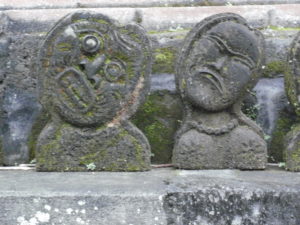
In 2010 Roberto and I spent a month in Bali with the Bali Art Project. We went with friends who founded this remarkable program that takes eight lucky high school students and eight adults to spend a month in Bali, studying music, dance, painting and puppet making. For everyone who goes, it is life-changing, and I was no exception.

That first hot and humid morning, we all piled into our van and crawled through the clogged traffic to our gamelan lesson. The classroom was more like a temple, beautiful, ornate, with high-ceilings. And our teacher, we had been told, was not a mere teacher, but a master; we were very fortunate that he was willing to take us on. He was dressed traditionally and welcomed us with a smile full of the most brilliant white teeth. There were four rows in the orchestra, with gamelans of different sizes and different numbers of xylophone-like bars. He invited us to sit where we liked. I chose a mid-size model and slid onto the low stool facing my gamelan.

I have always been a good student. I pay attention, I try hard, I want to please. And so it was that I settled into my seat and awaited my instructions. Our master welcomed us and talked a bit about the cultural importance of the gamelan. He appreciated our interest in the art form and would do his best to teach us the basics. I was nodding. I would make him proud.
He began by demonstrating a simple tune, a stick in each hand, hitting the bars delicately yet firmly. He started again and asked us copy him. Two beats on the third and seventh bars, then one beat on the second and eighth, then three beats on the fourth and fifth. We repeated this several times. If I concentrated with all my might, I could remember the pattern, and there was a thrill in hearing your own part harmonizing with the others. We moved on to the next section of the piece, a different pattern. We repeated it several times, and then linked it to the first.
When will the master bring out the black board, I wondered, so that I can see the pattern? Surely he will number or letter the bars so that I can memorize the piece more easily. But this was not to be. We were to learn by listening and repeating, listening and repeating. I am not very musical and my confidence was slipping. After about 45 minutes we had “learned” four sections, which were repeated in different orders to complete the piece.
“We will have a little rest and drink some tea,” said the master. “But first let’s play the piece from the beginning to the end.”
He raised his sticks high so we could all see the cue, and then let them fall on the first pair of bars. We all played with him. The others, especially the students, seemed to be relaxed and having a wonderful time, banging out the tune without a hitch. But anxiety was building in me. I made it through the first section, but on the transition to the second section I blew it, and that was not the only time. With each mistake I grimaced and emitted a little groan. At one point I held my sticks up, having no idea what I should do next. The song went on all around me. I was not making the teacher proud. At the end, the other students got up and headed for the tea. I sat there staring at my gamelan as if it were a creature that had betrayed me.
I looked up to see the master making a bee line for me. I was ready to apologize and say that I would study the patterns before the next class if he could just write them down for me. But before I could open my mouth, he was in front of me, smiling his brilliant smile. He had been watching me struggle through the song.
“You know, when you make a mistake,” he said slowly, “it has already happened. It is in the past.” He paused letting the message sink in. “All you have to do is just stop and listen, and start again when you hear the beginning.”
In that moment, the heat, humidity and traffic were all worth it. A mistake is a thing of the past. We need to listen for that new beginning and try again.
A lesson for us all as we begin again in 2017.


Awesome post, Lucy.
Thank you, Jess. And a good new year to you all at Western. You are doing such good work.
A beauty, Lucy! The moment you told us what a great student you’ve always been I couldn’t wait to read how this fact would unravel and how, ultimately, what gem you would find. Practicing this acceptance of whatever has been – in ourselves and with those for whom we’ve had loooong relationships (and somehow I guess this has to extend to those WE KNOW are out of their minds) is most certainly a great first step into the new year. L’hiem!
Ah, yes, we “good students” have the most to learn….thanks, Judy, and hang in there. Your energy, creativity and beloved wackiness are more needed than ever.
Beginning is now.
yup
Wonderful. A mistake has already happened. It is in the past.” I’ll remember that.
yes, the trick is to remember it in that moment of horror!
Great message, Lucy! Happy New Year!
Thank you, Nancy, as a world traveler I know you can relate. Hope it’s a good new year for you, too, neighbor.
Lovely post, Lucy – a wonderful reminder when we approach new things.
Thanks Lucy about reminding us that we can always learn something new.
Ahh the joys of international travel! I’d love to hear the “rest of the story”. How did all this begin, what was the impetus to travel to Bali, how did the group come together, More Ms Moore.
Hi Larry — you can check out baliartproject.org/ for the story of its origin and a bit about the awesome founders Gaylon Duke and Zenia Victor, world travelers and educators who instead of “retiring” decided to expand (as in “blow”) the minds and hearts of young people by taking them for an in depth experience in a country that is very different from ours.
Wonderful! Thank you!
Off I go, into my day, with this in my mind and heart –– I intend to do a little more stopping and listening this year.
“You know, when you make a mistake,” he said slowly, “it has already happened. It is in the past.” He paused letting the message sink in. “All you have to do is just stop and listen, and start again when you hear the beginning.”
Thanks, Elizabeth, happy and productive listening in 2017.
A fine lesson! I, too, yell at myself for some small thing I’ve just done, or some large thing done long ago. Those judgments all seem to arise from unmet expectation of myself. Maybe starting over should include revising those expectations – either upward or downward.
Love your riff on this topic, Richard. Thank you. Yes, what on earth are we expecting of ourselves — perfection?
That was a priceless music lesson. And musically-challenged, I felt your anxiety.
love this idea of letting go of whatever is past and feeling free and unfettered to start again. Thanks, Lucy1